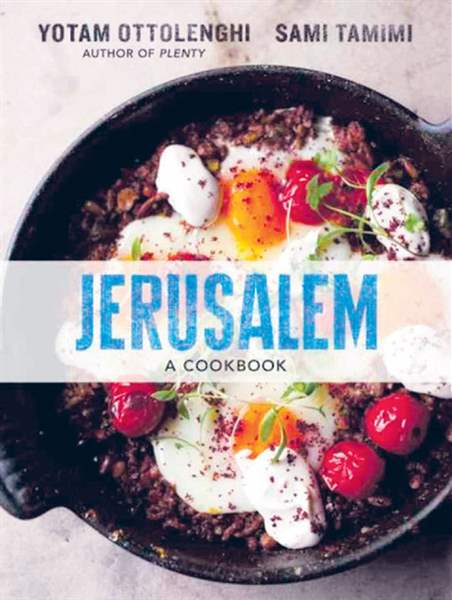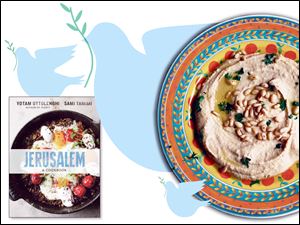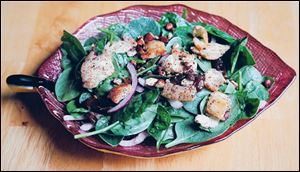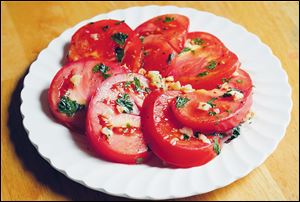
FOOD & NUTRITION
Authors hope to bridge cultures with ‘Jerusalem: A Cookbook’
8/12/2014

Hummus, a recipe in 'Jerusalem: A Cookbook,' by Yotam Ottolenghi and Sami Tamimi.

Spinach salad.
This is not a space for contentious arguments, unless the subject of pizza comes up and Chicagoans and New Yorkers vie passionately to defend their hometowns‘ drastically different versions of it.
This is a space dedicated to the principle that people bond over food. And this bond can form even among those who come from different sides of a war-torn region whose perpetually-smoldering embers have been flaring fiercely again this summer.
Today, this space is offering hope for a lasting peace in the Middle East, and doing so by celebrating some amazingly delicious food representative of the myriad cultures, histories, and traditions found there.
Yotam Ottolenghi and Sami Tamimi are the authors of the award-winning Jerusalem: A Cookbook. “We both grew up in the city, Sami in the Muslim east and Yotam in the Jewish west,” they say, “but never knew each other.”
Only after both first moved to Tel Aviv and then to London, where they are partners in the restaurant named Ottolenghi (Mr. Tamimi is also head chef), “did we meet and discover our parallel histories; we became close friends and then business partners,” they write.
They bonded over food, especially their shared love of the food of their mutual homeland, which they say is characterized by “diversity and richness.”

Fried tomatoes.
Although those who live in the Middle East “have so much in common,” write Mr. Ottolenghi and Mr. Tamimi, “food, at the moment, seems to be the only unifying force in this highly fractured place.”
“It takes a giant leap of faith,” say Mr. Tamimi and Mr. Ottolenghi, “but we are happy to take it -- what have we got to lose? -- to imagine that hummus will eventually bring (us all) together, if nothing else will.”
Contact Mary Bilyeu at mbilyeu@theblade.com or 419-724-6155 or on Twitter @foodfloozie.
RECIPES
- 1-1/4 cups dried chickpeas
- 1 teaspoon baking soda
- 6-1/2 cups water
- 1 cup plus 2 tablespoons light tahini paste
- 4 tablespoons freshly squeezed lemon juice
- 4 cloves garlic, crushed
- 6-1/2 tablespoons ice-cold water
- Salt
- Optional additions: cooked and crushed chickpeas, ground cumin, additional lemon juice or tahini, toasted pine nuts, a drizzle of olive oil
Basic Hummus
For “Arabs and Jews alike, the idea of dining alone is abhorrent. Eating is a celebration, a feast, it is about breaking bread and about conviviality, it is about abundance and sharing.”
The night before, put the chickpeas in a large bowl and cover them with cold water at least twice their volume. Leave to soak overnight.
The next day, drain the chickpeas. Place a medium saucepan over high heat and add the drained chickpeas and baking soda. Cook for about 3 minutes, stirring constantly. Add the water and bring to a boil. Cook, skimming off any foam and any skins that float to the surface. The chickpeas will need to cook between 20 and 40 minutes, depending on the type and freshness, sometimes even longer. Once done, they should be very tender, breaking up easily when pressed between your thumb and finger, almost but not quite mushy.
Drain the chickpeas. You should have roughly 3-2/3 cups now. Place the chickpeas in a food processor and process until you get a stiff paste. Then, with the machine still running, add the tahini paste, lemon juice, garlic, and 1-1/2 teaspoons salt. Finally, slowly drizzle in the iced water and allow it to mix for about 5 minutes, until you get a very smooth and creamy paste.
Transfer the hummus to a bowl, cover the surface with plastic wrap, and let it rest for at least 30 minutes. If not using straightaway, refrigerate until needed. Make sure to take it out of the fridge at least 30 minutes before serving.
Yield: 6 servings
Source: Jerusalem: A Cookbook
Fried Tomatoes with Garlic
- 3 large cloves garlic, crushed
- 1/2 small hot chile, finely chopped
- 2 tablespoons chopped flat-leaf parsley
- 3 large, ripe but firm tomatoes (about 1 pound in total)
- 2 tablespoons olive oil
- sea salt and freshly ground black pepper
- rustic bread, to serve
“These tomatoes, eaten by Palestinians any time of the day when tomatoes are in season, are not an earth-shattering revelation, but they are quietly and surprisingly fantastic” when served with nearly any entree or even with “a thick slice of good bread.“
Mix the garlic, chile, and chopped parsley in a small bowl and set aside. Top and tail the tomatoes and slice vertically into slices about 2/3 inch thick.
Heat the oil in a large frying pan over medium heat. Add the tomato slices, season with salt and pepper, and cook for about 2 minutes, then turn over, season again with salt and pepper, and sprinkle with the garlic mixture. Continue to cook for 2 minutes or so, shaking the pan occasionally, then turn the slices again and cook for a few more seconds, until soft but not mushy.
Turn the tomatoes over onto a serving plate, pour over the juices from the pan, and serve immediately, accompanied with the bread.
Yield: 2-4 servings
Source: Adapted from Jerusalem: A Cookbook
Baby Spinach Salad with Dates and Almonds
- 1 tablespoon white wine vinegar
- 1/2 medium red onion, thinly sliced
- 3-1/2 ounces pitted Medjool dates, quartered lengthwise
- 2 tablespoons unsalted butter
- 2 tablespoons olive oil
- 2 small pitas, about 3-1/2 ounces, roughly torn into 1-1/2-inch pieces
- 1/2 cup whole unsalted almonds, coarsely chopped
- 2 teaspoons sumac
- 1/2 teaspoons chile flakes
- 5 ounces baby spinach
- 2 tablespoons freshly squeezed lemon juice
- salt
”The flavors and smells of this city are our mother tongue .... They define comfort for us, excitement, joy, serene bliss.“
Put the vinegar, onion, and dates in a small bowl. Add a pinch of salt and mix well with your hands. Leave to marinate for 20 minutes, then drain any residual vinegar and discard.
Meanwhile, heat the butter and half the olive oil in a medium frying pan over medium heat. Add the pita and almonds and cook for 4 to 6 minutes, stirring all the time, until the pita is crunchy and golden brown. Remove from the heat and mix in the sumac, chile flakes, and 1/4 teaspoon salt. Set aside to cool.
When you are ready to serve, toss the spinach leaves with the pita mix in a large mixing bowl. Add the dates and red onion, the remaining olive oil, the lemon juice, and another pinch of salt. Taste for seasoning and serve immediately.
Yield: 4 servings
Source: Jerusalem: A Cookbook